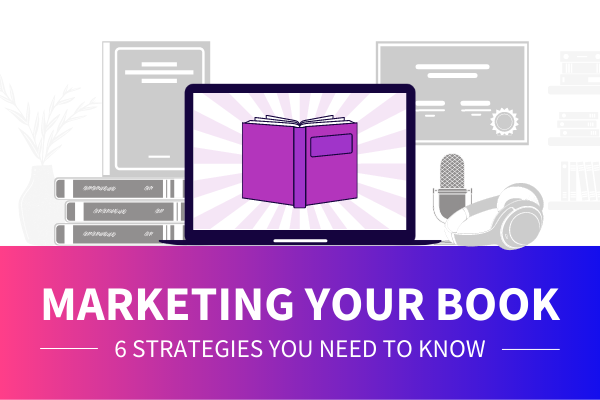You’ve just written a book—congratulations! This is a huge accomplishment worth celebrating. Whether this is your first book or seventh, this is a great investment into your business. However, as all experienced publishers and writers know, it’s not enough to post about your book online and expect it to become a best-selling hit. You need to know the best strategies for marketing your book to actually get it noticed.
With more speakers and professionals seeking additional forms of income, promoting a book demonstrates your expertise. It shows that you know enough about a topic to write an entire book about it. Still, you could write the Next Great American Novel, but that won’t be enough if nobody knows about it. More business owners are writing books than ever before. What sets you apart?
While it might sound harsh, writing a book on its own isn’t enough. You aren’t likely to have overnight success if you don’t know the best tips for marketing your book. If you’re a self-published author, the full marketing and sales strategy falls on your shoulders. Since you don’t have the might (and budget) of a big-name publishing house, it’s up to you to get the word out.
Like all forms of marketing related to your business, it’s about growing connections and knowing your audience. You know your book best (because you wrote it!), so you’re your biggest marketer. If you know who your ideal reader is and how they fit into your target audience, odds are the best ways of marketing your book fit naturally with your marketing strategy. You’ve already put so much time and effort into writing, editing, and preparing your book. Don’t let it collect dust on a physical (or digital) shelf. Here are 6 strategies you need to know for marketing your book. 📚
Keep your book under your personal brand.
To begin, don’t think of your book as a separate entity from yourself. It’s a part of your brand, just like your blog content, podcast episodes, and more. While many professionals market their book under a separate website, this doesn’t always scale well. Sure, if you’re writing something you don’t want to associate with your professional name (we won’t judge 👀), then having a separate brand is a good idea. Otherwise, consider it under your own personal brand umbrella.

In other words, if you end up writing more books down the line, you wouldn’t expect each one to have its own website. This is overwhelming, confusing, and expensive. You want them all listed together on your main, personal website. This means when a user finds one book, they’re more likely to consider buying others.
As an author, think of your website as a home for your book. While it’s true you can promote your book solely on Amazon, your author platform, or social media, why limit yourself? Having your book prominently on your website is a form of thought leadership, and it builds trust. When you promote your book solely on other platforms, it’s like renting a space. You don’t own this content as you do on your website, and you can’t count on social followers being around forever.
Ways to keep your book under your brand:
- Include a landing page for your book on your website that’s easy to find.
- Link to your book and key passages in relevant blog posts.
- Share your book on social media, getting the attention of your existing audience.
- Communicate with your email subscribers about your book launch, updates, and special deals.
- Post a blog post sharing key insights from your book while encouraging users to buy their own copy.
Speak for free in exchange for book purchases.
Similarly, consider your book as a way to sweeten the deal for potential clients. When speaking about your area of expertise, your book is a valuable sales tool. For example, you might pitch something like, “If you buy a copy of my book for everyone in the audience, I’ll come to deliver a keynote for that audience free of charge.” This is an especially useful strategy if you’re new to speaking and trying to break into the industry.

Your client list can co-exist with your book networking list. Many companies, schools, organizations, and more love this kind of all-in-one strategy. Not only does this seem more cost-effective for the client, but it’s a great way to build a long-term working relationship. Since you get your book into the hands of the audience, they’re more likely to think of you when they think of your area of expertise. In other words, this is a powerful way to expand your reach.
It takes time to build a list when you’re first getting started. This is why a speaker CRM is a super helpful tool to have when marketing your book. However, don’t be afraid to speak for free if it’s a way to promote yourself and your personal brand. When you pivot your thinking of your book as a sales tool, it’s easier to promote your expertise.
Ways to use your book as a sales tool:
- Encourage readers to join your sales funnel, like signing up for your email list or following you on social media.
- Include bonus content in your book like workbooks, downloadable guides, or audio tools.
- Develop your book into a course, webinar, or special bonus to attract more leads.
- Pitch a free book signing or author Q&A with the purchase of a keynote.
Share posts about your book on social media.
Next, make a big fuss about your book on social media. You just wrote a book! That’s amazing, so don’t be afraid to celebrate and toot your own horn. A reported 97% of people who start writing a book never finish it. You’re a part of the 3% that made it happen. However, if you’ve already published the book, you needed to start marketing yesterday. Leading up to the launch and immediately after is the most important time to share posts about your book on social media.

Not only can you build anticipation, but you can keep your topic top of mind. From using writer-specific hashtags to connecting with influencers, this is an opportunity to get your followers excited. The more time passes after the launch, the less frequently you should share your book. However, don’t be afraid to promote yourself at relevant times, like if someone asks for book recommendations in your niche.
Consider which social media platforms are likely to have your audience and focus on those. If you’re in the marketing world, this might be LinkedIn and Twitter. When you post content regularly on these sites and engage with your community, you build a real audience for your readership.
Ways to share your book on social media:
- Use writing-specific hashtags to connect with the community online (#amwriting, #nonfictionwriter, #marketingwriter).
- Engage with other members of your niche on social media, responding to posts and being present.
- Share a copy of your book with influencers in your reader market in exchange for reviews and social media promotion.
- Use a social media scheduling tool to promote your book regularly leading up to the launch and soon after.
Build your book into your speaking packages.
With that in mind, don’t be afraid to build your book into your speaking packages. As a thought leader, people are hiring you for your expertise. Any way you can add more value is a way to sell yourself even further. For instance, your first package tier might be just a keynote. From there, your second tier might be a keynote speech and copies of your book for the whole audience.

By doing this, you not only boost book sales, but also create a better experience for your clients. A book is something tangible your audience takes home with them. This means your book rests in their home, office, or another visible place where they’ll think about it later. Unlike your keynote speech, it has a longer shelf life (pun intended).
When people are excited about the ideas in your keynote, they look for ways to share the word further. Your book is a tool to continue the conversation, generate future leads, and build a long-term impact. As part of your overall sales funnel, your book can also be looped into coaching, workshop, and consultant packages. When you package your brand in an easy-to-digest way, it’s possible to upsell yourself and your services while increasing the value.
Ways to build your book into your sales package:
- Create different tier levels for pricing your speaking and consulting work, considering the role of your book.
- Interact with your audience through your book with events like book signings, readings, and more.
- Add onto your book, offering free workbooks, additional chapters, and spin-off materials for loyal clients.
Build your book into your content marketing.
Additionally, your book is a natural part of your content marketing. While many first-time authors think of their book as a separate entity, we’ve established why it’s an important part of your overall brand. Writing a book is a big deal, and it carries a lot of credibility. Don’t be afraid to mention your book on podcasts, in blog posts, and across your marketing channels.

Your new book launch is also a great opportunity to amp up your content marketing. To drive excitement and readership, appear as a guest on blogs, podcasts, and webinars. By sharing some of the key insights from your book, you pique a new audience’s interest. This is even more powerful if you begin marketing before you launch your book. When you start early, you give publications and platforms a feeling of exclusivity, getting to learn these insights before they’re officially released in your book.
Even after the launch of your book, consider ways to turn your work into more content. Specific chapters might make great blog posts, and this can also entice potential readers. If possible, transform some of the content from your book into video format. With 68% of marketers seeing greater ROI from video, this is a powerful tool.
Ways to build your book into your content:
- Link to your book in blog posts, guest posts, and across social channels.
- Pitch publications and blogs for features leading up to the launch of your book.
- Re-work sections of your book into different types of content, like video, blog posts, and infographics.
Offer custom book packages.

Last but not least, offer custom book packers when marketing your book. While this is definitely not a small task, it does wonders for your overall value and client experience. For instance, Phil Jones offers customized books with unique forwards specifically geared towards the client’s audience. Writing a specific chapter, forward, or intro is more reasonable than re-working your entire book, so don’t be intimidated by this strategy.
Alternatively, you can offer the book branded to match your client’s aesthetic, add a custom workbook, or include freebies that are personalized. This is when you’re truly going the extra mile, and it can pay off big time. Because this is a relatively untapped idea, it’s sure to generate quite the buzz. Talk about memorable! It’s this type of thinking that sets you apart.
Ways to offer custom packages:
- Offer to write a custom intro geared towards specific audiences.
- Include add-on workbooks, downloads, or checklists created for a specific client’s needs.
- Ask the client what they would want in their perfect book package—and try to make it happen
Ultimately, marketing your book takes a strong strategy. If writing a book was easy, everyone would do it. Unfortunately, writing a book is only the first step. Some might even argue it’s the easiest step! From there, it’s your job as the writer and marketer to get your book in front of the right audience.
Luckily, you’re not starting from scratch. You have an awesome, expert-backed book behind you that positions you as a thought leader. It’s up to you to build this book into a sales tool in your marketing funnel. Sooner than you think, it’ll be attracting leads naturally.





